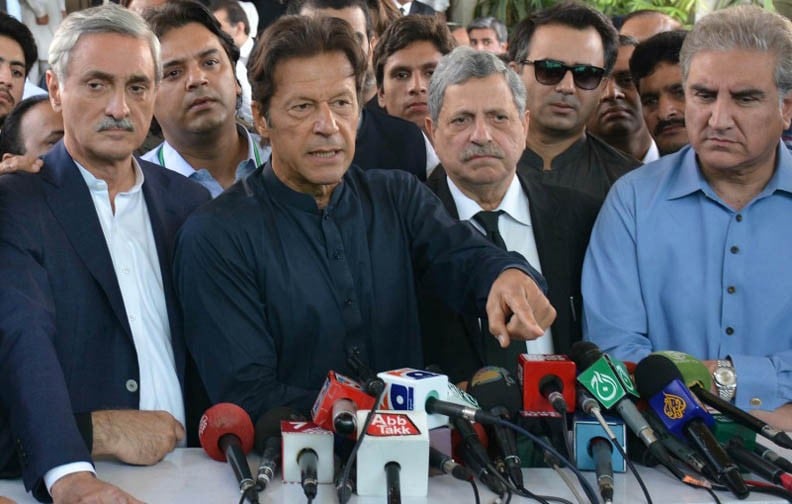
As the battle of Panama Leaks is being fought in the Supreme Court, political analysts believe the matter must be debated in the parliament

All eyes are now set on the Supreme Court of Pakistan where the Panama Leaks case is being heard by a five-member bench of the Supreme Court (SC) since January 4.
And this of course is followed by the two rival parties -- PML-N and PTI -- fighting their own legal and political battles in the media after the adjournment of the day’s proceedings.
The ongoing Panama Leaks legal battle is mainly between the PML-N and PTI, with a side role for the religio-political party Jamaat-e-Islami (JI). While other mainstream political parties have distanced themselves from this legal tussle, thinking the issue is more political and moral than legal. The Pakistan People’s Party (PPP) deliberately avoided moving the court against PM and his family in the Panama Leaks case despite having a strong legal team.
Many other political factions believe that in the case of Panama Leaks, the parliament’s role is much larger than Supreme Court. They are calling for making an effective law of accountability.
"The PTI has moved SC specifically against the prime minister and his family. We think it is not a person specific-issue. There is need for a parliamentary role in making laws to stop such transfer of money, rather than urging SC to do what is not its jurisdiction," says Zahid Khan, leader of the Awami National party (ANP). "If we talk of morality, then everybody who owns offshore companies should step down. Even many members of the PTI have offshore companies."
He thinks most people are doing politics on this issue while "we want accountability across the board". He calls for unanimous and honest efforts on the part of all the parties for effective legislation.
A private member’s bill, Panama Papers Inquiry Bill 2016, proposed by PPP senator Aitzaz Ahsan, was approved by the upper house of parliament on Dec 15, 2016 despite resistance from a number of senators. The bill, which now needs to be approved by the National Assembly, seeks to provide a legal process for inquiries into the trans-national and trans-jurisdictional secret transfers and deposits of vast sums of Pakistani rupees and resources by persons named in the Panama Papers. The government believes that the bill aims to target Nawaz Sharif, and to counter the move, the government has tabled a separate bill for general inquiry into offshore companies under the old Inquiries Act. The opposition parties have rejected the bill.
"We believe SC cannot make laws. The issue of Panama Papers will and ultimately come to the parliament, so why don’t we start the process for accountability," says Taj Haider, PPP’s parliamentary leader in Senate. "In Pakistan, accountability is a serious issue. Elite has no morality. They are interested only in becoming richer and richer."
According to him, in Pakistan, "rich are exploiting the poor in making money and then transferring that money abroad. The PPP has come up with a new law to hold those people accountable whose names have been mentioned in the Panama Papers."
And, by the next general elections, he says, "if corruption will not be an issue for the public then God save Pakistan".
Since the case has been taken up by SC, the defending PM and his children have changed their legal team a couple of times. They have presented spinning arguments and unsatisfactory replies to the court questions to prove the money trail used to purchase properties in the UK. The legal team of the PM and his children is more focused on challenging the jurisdiction of SC to take up this matter, while claiming constitutional immunity for the elected prime minister. In his two televised addresses to the nation and one in the parliament, Nawaz Sharif claimed to have the relevant record and documents to prove the legality of these properties and promised to present it before any legal forum. However, the PM’s legal team has termed his speeches as "political statement" and "broadened view with possibility of omissions".
"Let the court and people decide who is guilty (or not) because they have power to decide this matter and its all aspects. Accountability has to be done but it should not be selective. It should include everyone, each sector of the government to private and civil society," says Javed Jabbar, a prominent writer and political analyst. "That is why the judiciary has a great role to play. It has to evolve a large ethical and national framework within which people behave and institutions function."
Morality is an individual matter but at least we should show some ethics through our behaviour on such issues, he says, continuing, "The kind of energy we see the ruling party is investing in this case through its ministers outside the court everyday rather than focusing other issues like governance, we can guess their priorities."
He maintains that any wealth originally generated by our efforts in Pakistan is owed to Pakistan first and foremost, and not owed to invest in properties abroad. "I know we live in the age of globalisation but this age of globalisation should not be for corruption but justice -- justice with our own country. And we should focus on domestic investment rather than chasing foreign domestic investment."